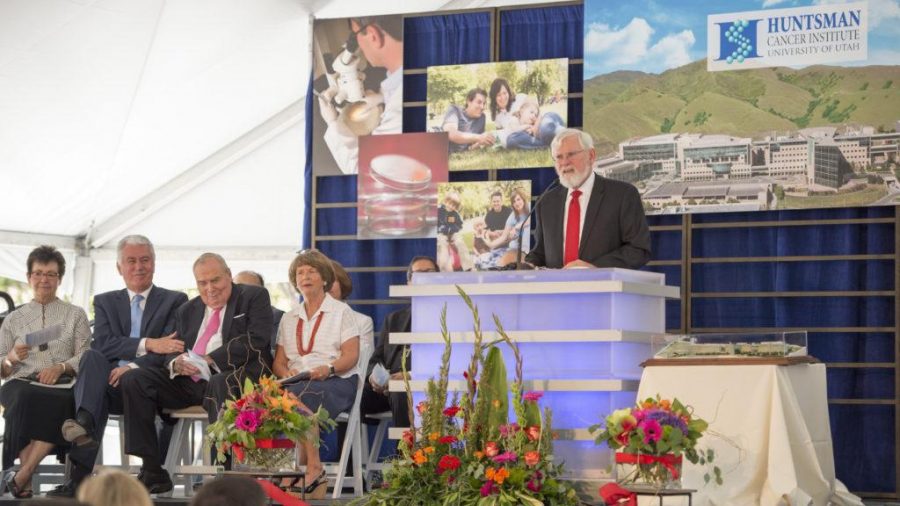More emails obtained by the Salt Lake Tribune expand on the changes in the relationship between Huntsman Cancer Institute (HCI) CEO and Director Mary Beckerle and University of Utah administrators, alternately improving and deteriorating repeatedly for almost a year before Beckerle was dismissed from her position in April.
For months before her removal, Beckerle voiced concerns that the U wasn’t meeting the financial obligations they had agreed to in a memorandum of understanding with Huntsman Cancer Foundation. This consternation pushed the foundation and the Huntsman family, who are the primary benefactors, to attempt to negotiate a new agreement which would increase the control their party has over the institute. They wanted the power to hire staff — a line of command that previously fell to former University of Utah Health CEO Vivian Lee, more funding and more control over parts of the cancer program outside of the institute. Beckerle was removed part way through negotiations because of these endeavors, department chairs were told.
One week later, Beckerle was reinstated. Soon after, Lee resigned from all of her administrative positions at the U and Pershing said he would resign once a new university president was selected. The search for his replacement had is currently underway.
At some points, the administrators discussed complaints of not only Beckerle but also several facets of the current operating agreement for HCI.
In one December 2016 email, Lee assembled a list of concerns for Pershing to address in a meeting. Lee felt that, despite spending millions of dollars on the institute, the U wasn’t “seeing that much return in terms of research productivity.” However, according to HCI’s website, the institute has discovered more genetic links to cancer than any other cancer center in the world.
Lee additionally felt that the foundation was carrying too much debt on the bonds used to pay for building construction and that the institute’s researchers weren’t attracting enough grants to help pay for their work. She criticized HCI’s marketing, which is handled by Huntsman Cancer Foundation.
It doesn’t appear that tension was exclusively between Beckerle and the administrators, but also between the U and Huntsman Cancer Foundation President and COO Susan Sheehan. In the same email, Lee wrote that Sheehan took control of “cancer donations” in a way that was off-putting to donors and U physicians alike, saying, “It’s highly likely Susan is unhappy about something.”
Pershing replied to the list, “Very nicely done.”
Peter Huntsman, CEO of the Huntsman Foundation and Huntsman Cancer Foundation, told Pershing in an email just a few days later that he planned to bring Sheehan to a meeting to discuss honoring the memorandum of understanding. Pershing and Lee agreed that it was not “good news” and tried to think of ways to meet without Sheehan.
“I wonder if you can ask for a private meeting with him,” Lee wrote. “Or if I can meet with him. Or if he could have Paul [Huntsman] join him. Or just about any other option.”
Pershing replied, “My thoughts exactly.” He emailed Peter Huntsman saying he wasn’t sure Sheehan should come since they weren’t planning to talk about fundraising. Peter said he saw Pershing’s point, but he would be bringing Sheehan anyway and would keep her participation to a minimum for topics outside of her authority.
When Pershing passed the news on to Lee, she said, “The unspoken issue here is the confidentiality of what we were going to share.” Lee explained she trusted Peter Huntsman, but didn’t trust Sheehan to keep the information from Jon Huntsman Sr. and Mary Beckerle, asking “Do we feel comfortable having this go to Jon?”
At other points throughout the talks with Peter Huntsman, Pershing and Lee celebrated “major improvements” in the relationship between the parties. A few days before Christmas 2016, they wrote that they hoped to “quickly tie up loose ends from the past and begin focusing on the huge opportunities we see.”
The talks were going so well that, on January 27, Lee invited Peter Huntsman to join the board for University of Utah Health. He later declined, citing time constraints.
In the next month, things appear to have soured considerably, although it’s not clear exactly why.
On February 24, Peter Huntsman emailed Pershing asking to meet in person with him and Lee to try to “resolve this issue once and for all.” He said that he thought the relationship between the U and his family was “at a very sensitive point” over the $13.5 million operating cost dispute that Beckerle had raised concerns over.
He said, “I have spent hours with the attorneys who drafted [the memorandum] as to the meaning behind the commitment.” Peter Huntsman concluded that the two parties had an honest disagreement over whether 25 percent of the profits from the cancer hospital, which are allocated to HCI in the memorandum, could be counted as part of that $13.5 million.
Pershing forwarded the email to Lee and said, “I wonder if there is a way we could agree to their understanding of the agreement but take total control of all cancer operations within the University? I mean so Mary really works only for you and we somehow also get control of the fund raising.”
Lee replied she was sorry relations had “come to this point.” In her email, she expressed a belief that Peter Huntsman understood the U’s point of view, but said, “he’s not in charge”.
Pershing replied to tell her he supported her and that they would get through the issue together.
A few days later, at the beginning of March, Pershing and Lee were forwarded an email about Beckerle’s increasing concern over the $13.5 million. Pershing asked Lee why Beckerle would think the decision belonged to the institute rather than the university’s hospital system. Lee replied, “She thinks she runs the hospital. We keep reminding her … but she can’t seem to remember.”
Despite the rising tension, the next day, Pershing expressed hope to Lee that they might “survive this.”
Lee then tasked senior hospital staff with drafting their own proposal for a new memorandum of understanding. She said they should consider the agreement of their dreams, not because it would happen, but because “the exercise is critical for us to engage in.”
March 20, however, is when Lee and Pershing found out Beckerle had promoted Sunil Sharma, then the Chief of Medical Oncology and Senior Director of Clinical Research, to the Deputy Director of Huntsman Cancer Institute — a position newly created for him. It was the opinion of Pershing and Lee that Beckerle did not have the authority to hire employees.
According to HCI Communications Director Ashlee Bright, however, “[As] CEO of HCI, Beckerle has the authority to hire employees at HCI. The CEO of HCI does not have the authority to appoint faculty. The deputy director position offered to Dr. Sunil Sharma was not a faculty appointment but rather an administrative role within HCI and the Cancer Center Support Grant on which Dr. Beckerle is principle investigator.”
Within a few days, Beckerle was removed from her administrative role at HCI.
University of Utah Health spokesperson Kathy Wilets said these emails are only records of past communications, and that the U is committed to moving forward in their relationship with Huntsman Cancer Foundation and the Huntsman family.
Peter Huntsman told the Salt Lake Tribune in an interview that he was disappointed to see the contents of the emails, and that it’s likely the exchanges will impact talks to create a new memorandum of understanding.
@EliseAbril



